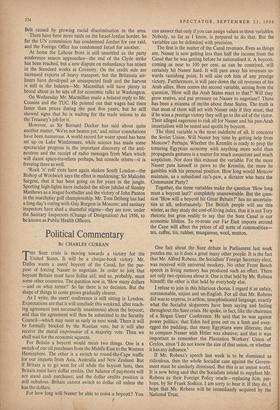Political Commentary
BY CHARLES CURRAN THE Suez crisis is moving towards a victory for the United States. It will be a cheque-book victory. Mr. Dulles wants a users' boycott of the Canal, for the pur- pose of forcing Nasser to negotiate. In order to join that boycott Britain must have dollar aid; and so, probably, must some other countries. The question now is, 'How many dollars —and on what terms?' So far there is no decision. But the shape of things to come grows gradually clearer.
As I write, the users' conference is still sitting in London. Expectations are that it will conclude this weekend, after reach- ing agreement (not necessarily unanimous) about the boycott; and that the agreement will then be submitted to the Security Council—which may meet as early as next week. There it will be formally blocked by the Russian veto, but it will also receive the moral imprimatur of a majority vote. Then we shall wait for the economic squeeze.
For Britain a boycott would mean two things. One is a switch of our oil purchases from the Middle East to the Western Hemisphere. The other is a switch to round-the-Cape traffic for our imports from Asia, Australia and New Zealand. But if Britain is to go west for oil while the boycott lasts, then Britain must have dollar credits. Our balance of payments will not stand cash purchases; and the dollar credits position is still nebulous. Britain cannot switch to dollar oil unless she has the dollars.
For how long will Nasser be able to resist.a boycott? You can answer that only if you can assign values to three variables. Nobody, so far as I know, is prepared to do that. But the variables can be delimited with precision.
The first is the matter of the Canal revenues. Even as things are, Nasser is now getting less than half the income from the Canal that he was getting before he nationalised it. A boycott. coming as near to 100 per cent. as can be contrived, will certainly hit Nasser hard. It will pare away his revenues to- wards vanishing point. It will also rob him of any prestige victory. Furthermore, it will pare down the oil revenues of his Arab allies. Here comes the second variable, arising from the question, 'How will the Arab States react to that?' Will they grow restive, and put pressure on Nasser to negotiate? There has been a miasma of myths about these States. The truth is that most of them will act with Nasser only if they must; that if he wins a prestige victory they will go to the aid of the victor. Their alleged eagerness to risk all for Nasser and his pan-Arab imperialism will be tested and spotlit by boycott.
The third variable is the most indefinite of all. It concerns the Soviet Union. Will Nasser buy time by getting help from Moscow? Perhaps. Whether the Kremlin is ready to prop the tottering Egyptian economy with anything more solid than propaganda gestures is a matter for much conjecture and much scepticism. Nor does this exhaust the variable. For the more Nasser puts himself in pawn to the Kremlin, the more he gambles with his personal position. How long would Moscow maintain, as a subsidised cat's-paw, a dictator who bans the Communist Party?
Together, the three variables make the question 'How long must a boycott last?' completely unanswerable. But the ques- tion 'How will a boycott hit Great Britain?' has no uncertain- ties at all, unfortunately. The British people will see this winter, as they study the cost-of-living index, that it is not Tory rhetoric but grim reality to say that the Suez Canal is our economic lifeline. To re-route our Far East imports around the Cape will affect the prices of all sorts of commodities— tea, coffee, tin, rubber, manganese, wool, mutton.
One fact about the Suez debate in Parliament last week puzzles me, as it does a great many other people. It is the fact that Mr. Alfred Robens, the Socialists' Foreign Secretary-elect. was received with universal mockery. No other Front Bench speech in living memory has produced such an effect. There are only two opinions about it. One is that held by Mr. Robens himself; the other is that held by everybody else.
I refuse to join in this hilarious chorus. I regard it as unfair, unreasonable, unjust and un-English. For all that Mr. Robens did was to express, in artless, unsophisticated language, exactly what the Socialist sloganeers have been saying and feeling throughout the Suez crisis. He spoke, in fact, like the chairman of a Slogan Users' Conference. He said that he was against power politics; that Eden had gone out on a limb and over- egged the pudding; that many Egyptians were illiterate; that to compare Nasser with Hitler was abusive; and that it was important to remember the Plantation Workers' Union of Ceylon, since 'I do not know the size of that union, or whether it has any influence.'
If Mr. Robens's speech last week is to be dismissed as ridiculous, then the whole Socialist case against the Govern- ment must be similarly dismissed. But this is an unjust world. It is now being said that the Socialists intend to supplant Mr. Robens as their Foreign Policy oracle—replacing him, per- haps, by Sir Frank Soskice. I am sorry to hear it. If they do, I hope that Mr. Robens will be immediately acquired by the National Trust.


































 Previous page
Previous page